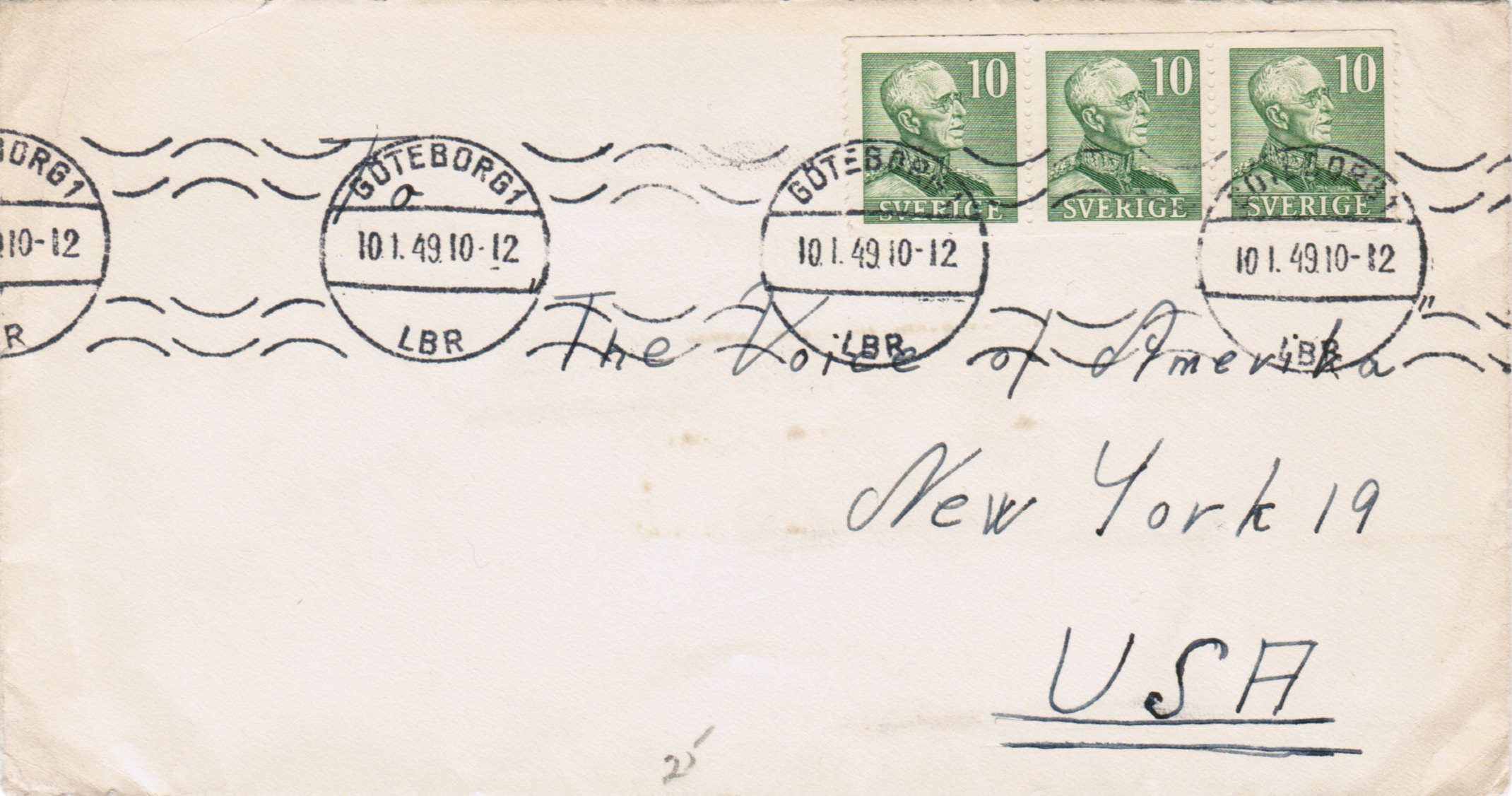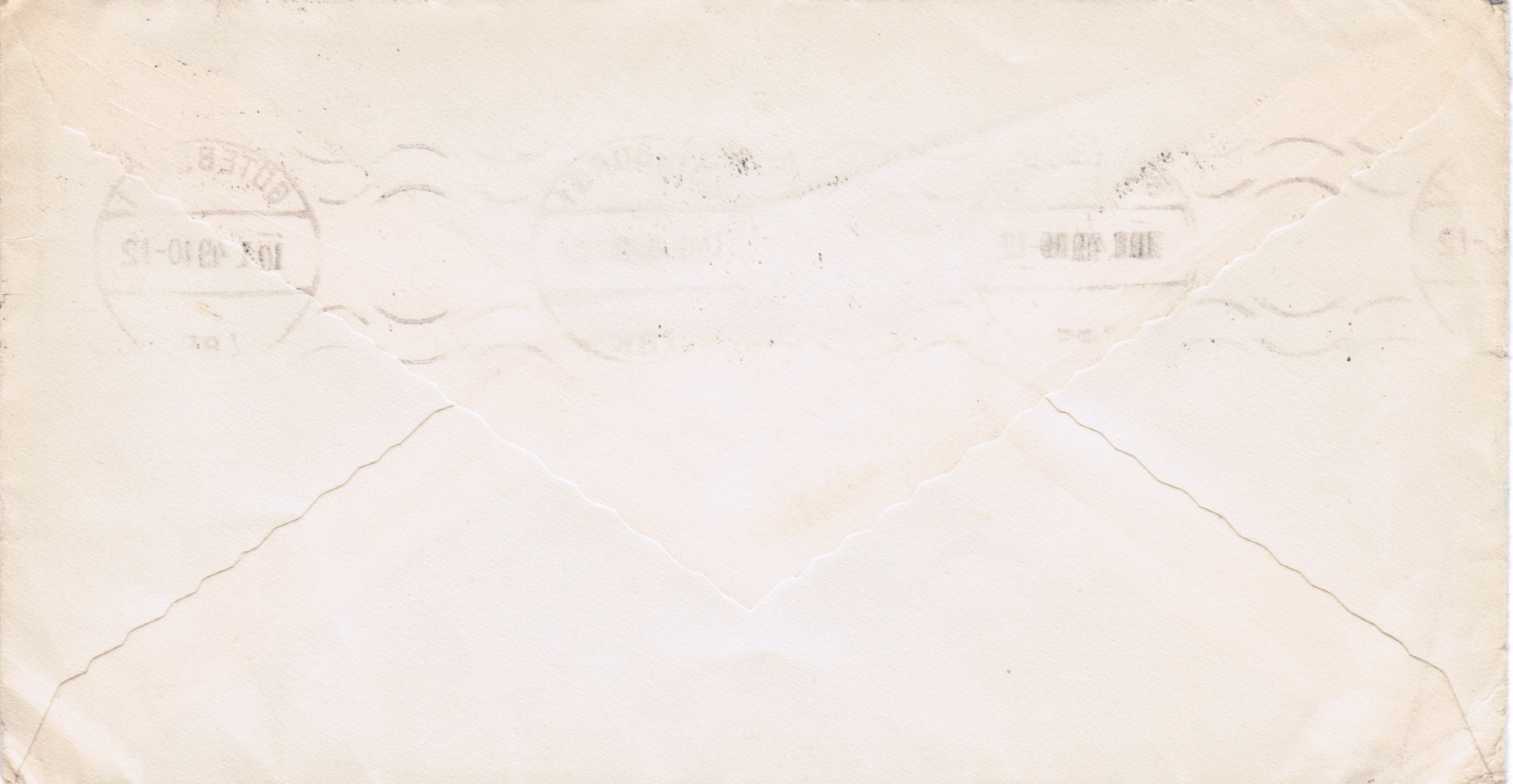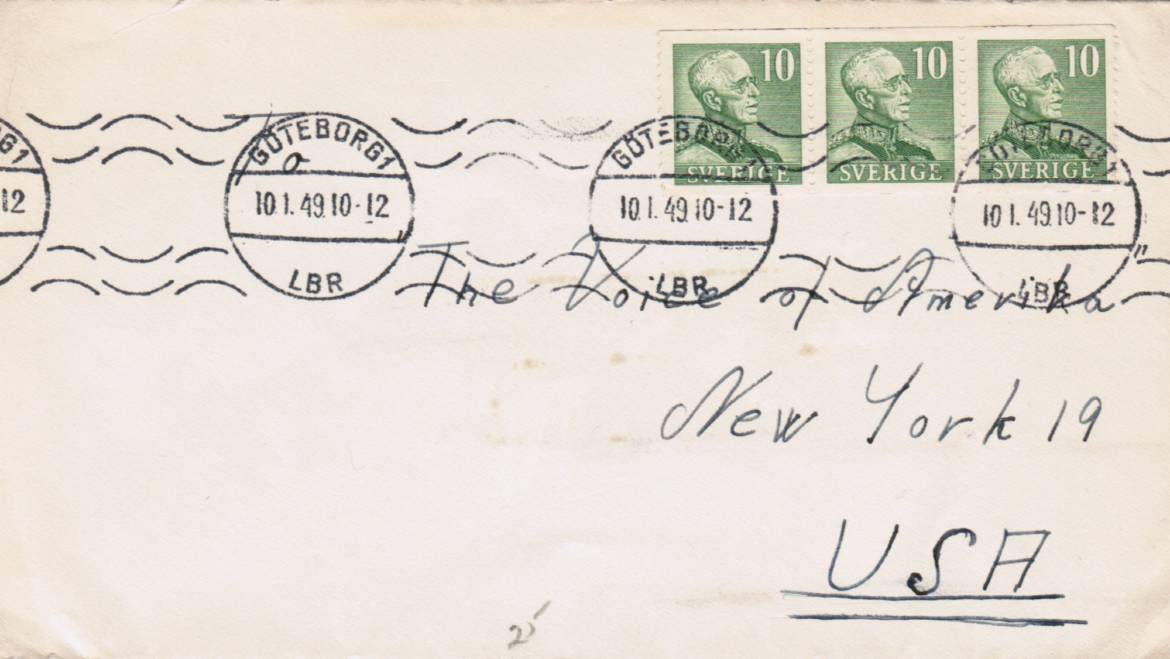Envelope for a Letter to the Voice of America from Sweden 1949
By Ted Lipien for Cold War Radio Museum and Voice of America – Hidden History
The letter from Güteborg, Sweden to “The Voice of Amerika,” “New York 19,” “USA” was postmarked January 10, 1949. The letter mailed in the envelope was not found.
In 1949, the Voice of America (VOA) no longer broadcast in Swedish and in some other Western European languages it used to broadcast during World War II. One of the Voice of America program schedules printed in German in 1950 showed that VOA still had direct broadcasts in German, Greek and Spanish, but Sweden was not on the list. In 1950, VOA still placed programs on stations in France and Italy. 1
A 1952 printed VOA German Service program schedule showed direct shortwave VOA programs in Italian, Finnish, French and Spanish, but direct broadcasts to these countries would soon be terminated due to low listenership and low impact. 2
Some VOA broadcasts to countries with free media, which were eliminated in 1945, were later restored but were subsequently canceled. VOA Swedish-language programs apparently were not included in the temporarily restored broadcasts. For some reason, VOA broadcasts to Finland, another Scandinavian country, were restored but lasted less than two years. According to the Voice of America European Division 1981 briefing book for the incoming Reagan Administration, Finnish-language VOA broadcasts were restored on June 1, 1951 after being eliminated in 1945 and were again terminated on September 13, 1953. 3 Although like Sweden, Finland was a neutral country, the Finns were strongly anti-Soviet and anti-Communist following the Soviet invasion and partial occupation of Finland in the Winter War of 1939-1940. The League of Nations declared the Soviet invasion illegal and expelled Soviet Russia from the organization.
According to information in “The Voice of America: a History of the International Broadcasting Activities of the United States Government, 1940-1962,” a Ph.D. dissertation by Robert William Pirsein at Northwestern University, 1970, Swedish-language broadcasts were included in the language list for July 1944. The next list, for December 1947, did not include Swedish. VOA may have had broadcast in Swedish only from 1944 to 1945. 4As all other VOA wartime programs, the broadcasts in Swedish were both anti-Nazi and almost certainly strongly pro-Soviet
VOA did not have a major impact as an international broadcaster in Western Europe during the war. References to VOA wartime broadcasts are rare in books, memoirs, and scholarly articles about World War II. The primary Allied international broadcaster in Europe from 1939 to 1945 was the British BBC. VOA also did not have much of an impact during the war in Eastern Europe, much of which was occupied by Nazi Germany. VOA may have been more popular in Western Europe and in Yugoslavia and Greece during the war because anti-Nazi communist resistance movements were more active there than they were in East-Central Europe.
VOA’s wartime broadcasts were more simplistic than BBC broadcasts and contained more pro-Soviet propaganda. The chief English VOA News writer and editor in 1943 was Howard Fast, a future Communist Party activist and recipient of the 1953 Stalin Peace Prize. 5
He was also a best-selling American novelist. 6
Many of the Soviet sympathizers and some Communist party members at the early Voice of America were hired by the first VOA Director and future Hollywood actor John Houseman. 7
He was forced to resign in mid-1943 after the State Department secretly complained about him to the Roosevelt White House and refused to give him a U.S. passport for official government travel abroad. 8
Many VOA broadcasts to countries in Western Europe which had free media after the war were discontinued in 1945 and in subsequent years. VOA had no measurable audience in Western Europe to such broadcasts, not even in countries like Spain which had state censorship under General Franco and only partially free media. Ironically, the Polish-language programs of Radio Madrid were more popular in Poland in the early 1950s than the Voice of America Polish broadcasts. 9 Even in pre-Castro Cuba, which under Fulgencio Batista had only partially free media, the Voice of America had no measurable audience either in Spanish or in English. 10 We do not know to which Voice of America program, the 1949 letter from Sweden was addressed, but whatever program it was, it was not widely listened to by the Swedes. By 1949, there were no direct Swedish-language VOA radio programs. It is, however, possible that VOA could have been providing short news feeds from New York to individual stations in Sweden. This was done on a limited basis for some West European countries to which direct VOA broadcasts were terminated.
While the remaining direct VOA shortwave and medium wave broadcasts to Western Europe also could not compete with free local media, VOA became popular in East-Central European countries behind the Iron Curtain once its programs changed from being pro-Soviet to reporting more fully on communist repressions in the later years of the Cold War. Prior to the programming and management reforms, broadcasts to Poland were criticized in 1951 in letters from listeners as being “uninteresting, drab, bureaucratic in tone, unconvincing.” 11
Similar criticism was noted earlier about direct VOA broadcasts to Western Europe, which had practically no audience after the war, but there was no specific criticism about VOA Swedish-language broadcasts during their brief presence on the air. Many of the VOA West European language services were dominated during the war by Soviet and communist sympathizers, but again there is no specific information about the individual broadcasters working for VOA’s wartime Swedish Service. In any case, the letter to VOA was sent from Sweden three years after the war and three years after the termination of direct VOA Swedish-language radio broadcasts.
The change of programs to communist-ruled nations was achieved several years after the war under pressure from the U.S. Congress, criticism in U.S. media and eventually directives from President Truman and Secretary of State Acheson. 12
By 1949, most of the pro-Soviet VOA officials and journalists had left, were removed or transferred to other positions. 13
The 1949 letter from Sweden was most likely written in response to a on-air contest in one of Voice of America English-language programs. VOA English-language broadcasts were listened to in Western Europe and in Eastern Europe after the war, but their audience reach was minimal. Most of the shortwave and medium wave radio listening in Eastern Europe to foreign radio broadcasts during the Cold War was to programs in local languages from Radio Free Europe (RFE), Radio Liberty (RL), BBC, Radio Madrid, VOA and a few other Western broadcasters.
During most of the post-war era, Sweden was governed by the Swedish Social Democratic Party, but Soviet communism was not popular among the Swedes. Although Sweden was officially a neutral country outside of NATO, it had a pro-Western and pro-U.S. foreign policy.

Envelope for a letter sent to The Voice of America (Amerika) in New York from Güteborg, Sweden January, 10 1949.

Envelope for a letter sent to The Voice of America (Amerika) in New York from Güteborg, Sweden, January 10, 1949, obverse.
Notes:
- Voice of America, “Die Stimme Amerikas Programme und Wellenlängen | Januar-Februar 1950,” Die Stimme Amerikas, January-February 1950. ↩
- Voice of America, “Die Stimme Amerikas Programme und Wellenlängen | Juli-August 1952,” Die Stimme Amerikas, July-August 1952. ↩
- “The European Division VOA/PE” (Washington, DC: Voice of America, July 1981). ↩
- Robert William Pirsein, The Voice of America: An History of the International Broadcasting Activities of the United States Government, 1940-1962, Dissertations in Broadcasting (New York: Arno Press, 1979. ↩
- Ted Lipien, “Created 70 Years Ago, Stalin Peace Prize Went in 1953 to Former Voice of America Chief News Writer Howard Fast,” Cold War Radio Museum (blog), December 21, 2019, http://www.coldwarradiomuseum.com/created-70-years-ago-today-stalin-peace-prize-went-in-1953-to-former-voice-of-america-chief-news-writer-howard-fast/. ↩
- Howard Fast, Being Red (Boston: Houghton Mifflin, 1990). ↩
- Ted Lipien, “First VOA Director Was a Pro-Soviet Communist Sympathizer, State Dept. Warned FDR White House,” Cold War Radio Museum (blog), May 5, 2018, http://www.coldwarradiomuseum.com/state-department-warned-fdr-white-house-first-voice-of-america-director-was-hiring-communists/. ↩
- President (1933-1945 : Roosevelt). 1933-1945, State – Welles, Sumner, 1943-1944, Series: Departmental Correspondence, 1933 – 1945, 1933. ↩
- “Voice of America 1951 – ‘Drab’ ‘Unconvincing,’” Cold War Radio Museum (blog), February 24, 2018, http://www.coldwarradiomuseum.com/2018/02/23/voice-of-america-1951-drab-and-unconvincing-rep.-wiggleswoth-quotes-listeners-in-poland/. ↩
- Ted Lipien, “Voice of America Had No Audience in Pre-Castro Cuba and Initially Supported Soviet Socialism in Eastern Europe,” Cold War Radio Museum (blog), February 24, 2020, http://www.coldwarradiomuseum.com/voice-of-america-had-no-audience-in-pre-castro-cuba-did-poorly-in-exposing-failures-of-soviet-socialism/. ↩
- “Voice of America 1951 – ‘Drab’ ‘Unconvincing,’” Cold War Radio Museum (blog), February 24, 2018, http://www.coldwarradiomuseum.com/2018/02/23/voice-of-america-1951-drab-and-unconvincing-rep.-wiggleswoth-quotes-listeners-in-poland/. ↩
- Ted Lipien, “Truman’s ‘Campaign of Truth’ at Voice of America Part I: Countering Soviet Propaganda Abroad and at Home,” Cold War Radio Museum (blog), March 25, 2021, http://www.coldwarradiomuseum.com/campaign-of-truth-at-voice-of-america-part-i/. ↩
- Ted Lipien, “Voice of America Polish Writer Listed As His Job Reference Stalin’s KGB Agent of Influence Who Duped President Roosevelt,” Cold War Radio Museum (blog), February 12, 2020, http://www.coldwarradiomuseum.com/voice-of-america-polish-editor-listed-stalins-kgb-agent-of-influence-as-job-reference/. ↩



Add Comment